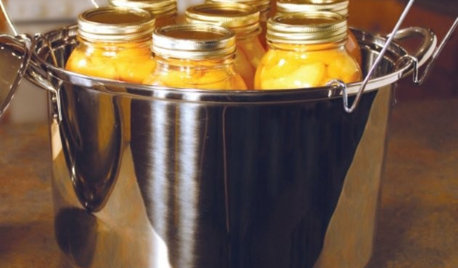Canning pickled eggs can be safe
It was time to start a new thread for this topic. The old thread was getting too long.
The purpose of this discussion, is to root out the truth about home canned pickled eggs.
It has been stated by many that this practice is completely unsafe and people should not engage in this practice under any circumstances.
My question has always been: "Why?"
What is the reason in a logical and scientific way?
I am going to lay out the facts as I see them. What I am hoping for, is that people will contribute to this topic with corrections and with new factual data that they can support. Personal points of view are interesting, but they don't contribute in the search for the truth.
Please, no "forum rage". Keep this peaceful. My intent is purely a search for the truth and to benefit the health and well-being of those many people out there canning pickled eggs in their home.
1) The USDA does not deem Home Canning of pickled eggs to be "Unsafe". They simply do not recommend it. But they do not say why they do not recommend it. See the bottom of this page: http://www.fsis.usda.gov/Factsheets/Focus_On_Shell_Eggs/index.asp It would be interesting to know the reason why they do not.
2) The NCHFP does not say that home canning of pickled eggs is unsafe either. They only state: "There are no home canning directions for pickled eggs." I think they mean there are none at their site. But they don't say it is Unsafe. See: http://www.uga.edu/nchfp/how/can_06/pickled_eggs.html.
It would be a benefit to those engaged in canning pickled eggs if the NCHFP came out with a statement such as: "We do not recommend canning pickled eggs for unrefrigerated storage, but if you are engaged in this activity, here is the proper way to do it..."
3) I believe the only fear people have of home canned pickled eggs, is the possibility of Botulism. But my question is why is this fear hung on Pickled Eggs? There truly has never been a single case of botulism from a person eating home canned pickled eggs. I will site the 1997 case of botulism, where a 68 year old man hard boiled some eggs, poked holes in them with toothpicks, then put them in a jar and poured vinegar and spices over them, and then set them on the counter for a week in the sun. His methods could not even be considered as "Home Canning" by anyone. So I think we can toss that example out as a data point. But you decide for yourself. Visit this page to read about it: http://www.cdc.gov/mmwr/preview/mmwrhtml/mm4934a2.htm
4) A 1990 to 2000 census study performed by the CDC reports (on average) about 23 cases of botulism occurred per year in the United States. See: http://www.cdc.gov/ncidod/EID/vol10no9/03-0745.htm Similar data is also reported at the bottom of this page: http://www.cdc.gov/mmwr/preview/mmwrhtml/mm4934a2.htm
Out of these cases of botulism, none were caused by home canned pickled eggs. (assuming you can dismiss the fellow in 1997 as a completely...
Comments (40)
readinglady
15 years agoIt's unfortunate the UC Davis document is not dated. Nor does it state the size of jars.
I do notice that formula calls for 100% vinegar and a longer processsing time than that of the original formula under discussion. Jars probably would be quarts. Half-gallons are only approved for high-acid juices.
I would point out that it is possible for botulism to develop in a high-acid solution. Density is the issue; botulism spores have been identified in solid chunks within high-acid mixtures (i.e. salsas). So penetration of the vinegar throughout the egg would be important.
For your other questions, you can always email Dr. Elizabeth Andress at the NCHFP for specifics regarding the science behind a recommendation. She and her colleagues are very good about responding promptly.
Carol
Here is a link that might be useful: Contact the NCHFP
Related Professionals
Forest Park Landscape Architects & Landscape Designers · Redondo Beach Landscape Architects & Landscape Designers · Winder Landscape Architects & Landscape Designers · Waterbury Landscape Contractors · Barrington Landscape Contractors · Canton Landscape Contractors · Fishers Landscape Contractors · Kerman Landscape Contractors · Marlborough Landscape Contractors · Santa Maria Landscape Contractors · Suitland Landscape Contractors · Hawaiian Gardens Landscape Contractors · Maple Heights Landscape Contractors · Charleston Roofing & Gutters · Reno Roofing & GuttersLinda_Lou
15 years agoThis is what you posted:
It would be a benefit to those engaged in canning pickled eggs if the NCHFP came out with a statement such as: "We do not recommend canning pickled eggs for unrefrigerated storage, but if you are engaged in this activity, here is the proper way to do it..."As someone who teaches USDA methods I can assure you that would not be written....
The pickled eggs are not the only food that has a potential for botulism when canned. There are many.
I have studied this stuff for over 8 years.
Again, please just contact Elizabeth Andress and get a REAL qualified person to discuss this with. I know of no one else who has any higher credentials than she does.
I have personally contacted her many times and find her to be extremely helpful.digdirt2
15 years agoCarol and Linda Lou are right Rick. Just write to Dr. Andress. She answers questions for us all the time and she has the credentials to do it and the authority to speak for the NCHFP.
We have already answered several of your "whys" to the best of our ability here. For most of us, most of the time, the fact that the rules exist and our understanding of the reasons for them is sufficient. When we're in doubt, Linda Lou always steers us right.
But we can't resolve the issues to your satisfaction here and we certainly don't have the authority to change them. Dr. Andress possibly can.
Dave
pickled_eggs
Original Author15 years agoThanks, I will contact her and invite her to this forum.
The link that Carol put in to contact Dr. Andress goes to the University of California Pickled Egg Page, so I'm not sure how to contact her.
What is odd, is that the link to UofC on my original post use to work, but now is garbled and doesn't work. It showed instructions for canning pickled eggs.
And it would be nice if that PDF had a date on it.
I will post that link again here:
http://ucce.ucdavis.edu/files/filelibrary/2019/1531.pdfCan you post a working link to Dr. Andress?
Thanks... Rick
Here is a link that might be useful: University of California - Canning Pickled Eggs
pickled_eggs
Original Author15 years agoCarol,
Regarding the date to the University of California Canning Pickled Eggs document found at: http://ucce.ucdavis.edu/files/filelibrary/2019/1531.pdf... That document is dated July 25th, 2006
I downloaded that file and looked at it's "last modified date".
Rick
Here is a link that might be useful: http://ucce.ucdavis.edu/files/filelibrary/2019/1531.pdf
morz8 - Washington Coast
15 years agoThe 100 post per thread rule was increased some time back, I've seen them much higher in count, well over 100 comments.
I would rather all thoughts on this particular discussion had been kept in one place, save people having to look elsewhere for what has already been said and suggested.
digdirt2
15 years agoYeah limit is now 150.
eandress@uga.edu
Here is a link that might be useful: Dr. Elizabeth Andress profile
Linda_Lou
15 years agoThat is a good site with the info on Elizabeth Andress.
However, 2 years ago when I had a video conference with her she looked older than that. She is a very kind, down to earth lady. I have great respect for her.melva02
15 years agoThis thread needs a link to the previous thread (included in the link field below), so new visitors are able to read all of the food safety issues we raised about your recipe on that thread. Anybody who visits this forum needs to get a well-rounded idea of the consensus opinion on the recipe, rather than just assuming it's safe because it's posted here.
As I stated on the other thread, given the inherent risks of canning something as dense as an egg, I believe unrefrigerated home-pickled eggs are best consumed by consenting adults. I think it would be unethical for you to serve these to someone else's children without warning the parents of the risks or at least the controversy over the product.
I also think you should link the recipe on your web site to the discussions at this forum, out of consideration for your web visitors. Someone might see the canning procedure in your recipe and not realize that the canning safety authorities would consider your recipe high-risk. That person could make themselves or their family sick.
Melissa
Here is a link that might be useful: the original thread where several of us stated why we don't think any form of this recipe is safe
pickled_eggs
Original Author15 years agoOnce again, I would like to keep this thread limited to fact and science, not opinion. The old thread is mostly forum rage and opinion. But people should go read it if they are so inclined. But if they do, they should ignore the recipe that someone pasted in the beginning of that thread. That recipe is outdated. We are moving forward, not backward.
Let's work toward a recipe and procedure that is safe. Review the recipe found at: http://www.kuntzfamily.com/recipes/pickled_eggs.shtml
The point of having a new thread, is threefold:
1) Create a pickled egg recipe that follows the same USDA guidelines that commercial producers use.
2) To educate the home pickled egg caners out there how to do it with the utmost safety. Because, they will continue to pickle eggs at home regardless. They might as well have the best information available. To not provide them with accurate information, would be the tragedy waiting to happen.
3) To dispel the belief that the "Sky is falling" when it comes to home canned pickled eggs. There has never been a case of botulism attributed to properly home caned pickled eggs. (as stated in the beginning of this thread with supporting evidence).
Let's not rehash opinions. Just facts and science.
If you can add to this discussion productively, that would be great. If you can refute any of these points with facts, that would welcomed. But opinions are not.
Regarding Carols comment earlier: "So penetration of the vinegar throughout the egg would be important."I would love to hear more about this. I may have misinterpreted Dr. Snyders statement at: http://www.hi-tm.com/Facts&tips/Pickled-eggs.html that said as long as the egg was not punctured or cracked, the egg did not need to be penetrated by the vinegar, just the surface needed to be exposed to the low PH.
Respectfully,
Rick
ksrogers
15 years agoOne important issue about the USDA is I forgot to mention that when they do not 'recommend' a specific food to be home canned or a specific process to be used (steam canners), its usually due to the fact that they have no laboratory proof of safety for these things. The US Government has all they can do with common issues for the general public and agriculture in general. If someone had a USDA accredited test lab that can show substantiated proof about a specific process or food to home can, and all the test results made are performed and approved by the USDA, then these things can be safe to can. If its not recommended, its usually a good indication that the USDA has simply not tested or bothered to test such things, so they simply say 'not recommended', to cover their behinds. Washing (in water) a freshly layed egg in its shell is not recommended either, as someone told me that a while back. Then there is the issue of pasturized eggs.. hmmm..
grandma44
15 years agoOh my, I can't believe anyone is still pickling eggs at home and not keeping them in the refrigerator! That hasn't been considered safe since I was young girl. I'm now 75 so that was many years ago.
I remember one church picnic, oh that must have been back in the late 50's or early 60's when my brother and I and half the congregation got sick with bad gut problems and all of us ended up in the hospital in Memphis. The only common thing we had all eaten was some of Millie Phillips home canned pickled eggs. She brought several jars to that picnic and everyone loved them. Needless to say Millie never made them again.
Now I'll admit that I don't understand all of this discussion's details but pickling brine I most certainly do understand. That brine has to be strong, not wishy washy. And no mater what you may be pickling be it cucumbers or watermelon rind or eggs, that brine simply must penetrate all the way through the food for it to be safe. It has to get right into that yolk so that yolk is just as pickled at the rest of it is. That strong vinegar brine is what keeps any bacteria from growing and if you think egg yolks don't have bacteria then you must be raising a bunch of real hygenic chickens unlike the rest of us are. Are your chickens free range? Do they ever poop in thier nest? Do you replace their littler daily? Do you gather the eggs as soon as they are laid? Ever overlook a few? Hardboil them right a way? Any of them sit around for a couple of hours or even a day before getting boiled? Do you boil them hard for at least 20 minutes or just a quickie 12?
You say you want a recipe and procedure that is safe. Then all you have to do is make them up a big jar or 2 at a time and keep them in the refrigerator. If you want more than a few jars then you'll just have to get a bigger refrigerator because there is no other safe way to make and store them.
Ethyl
pickled_eggs
Original Author15 years agoLinda Lou, you said: "As someone who teaches USDA methods I can assure you that would not be written....
What I am yearning for, is why? Why would that not be written? Why wouldn't we, as a people, have accurate information be published?
Please explain.
Rick
pickled_eggs
Original Author15 years agoDear Ethyl,
I respect your wisdom and experience and your points remind me of me dear sweet grandma who held me on her knee. She is still with us at 98 years young.
What I am trying to discover, is how commercial pickled egg caners can do it with caged, non-fresh eggs, and keep those jars on the shelf for a year, but we are told we are not suppose to do it at home and no one will explain why or support their reasons with science.
I'm just searching for the answer. I don't mean anyone any harm.
Rick
ksrogers
15 years agoThe secret, blasted with neutron radiation, which kills any, and everything, and leaves no residual radiation. Its called 'Shelf Stable', and I have cooked chicken breasts with gravy and mashed potatoes packed in plastc trays sealed with a plastic film lid. made by Hormel. No refrigeration needed, and you simply poke a couple of holes for steam, in the plastic film and nuke in the microwave for about 2 minutes.
Linda_Lou
15 years agoIt IS accurate. Those things that are mentioned ARE tested, contrary to some opinions. I am on this side of things and sometimes have different access to information than the general public. I have special training manuals,etc. I have a whole list of reasons about steam canners, but I do not have anything published for the general public. I am sorry, that is how it is. As I said, if you want more information, contact Elizabeth Andress.
So, for you to say those things, you do not have all the facts.
Even when I have taken the time to type it all out, there have been those who have not thought that good enough, since it is not from an official website or book......
I can do no more for you.
Thank you, Ethyl, for you input.
Yes, the vinegar/acid does have to penetrate the whole food.It is called equilibrium pH?
Equilibrium pH is the final pH of a food product after the acidulant (food acid) reaches equilibrium (same pH value) with the food itself. For example, the initial pH of fresh cucumbers in vinegar will not have the same pH as the vinegar until equilibrium has been obtained.
Ph is not just tested with a meter in a jar. Things are ground up,pulverized, done different things with when they are tested. Foods are purposely inocculated with botulism, then canned, and tested to see if and how much toxin grows. Tested at different intervals of time.
So, those who feel that all you need to do is stick a meter in a jar, you are mistaken. Density is also an issue in safe canning. How do you intend to reliably test for density ?
It has taken food scientists to test these things, not just home canners.
If you all want to do those things, go ahead. What you do in your own kitchens is up to you. All I can do is teach current safe guidelines. Then, the liability and responsibility is up to you.
Besides, as I said before, I just do not understand the insistance of people just to have certain foods in a jar. Makes no sense to me at all.ksrogers
15 years agoI hope you don't think I am condoning a steam canner to be used with pickled eggs. I mearly pointed out that the USDA has no tests done on the steam canners so they than can't fully qualify them as being OK to use just for HIGH ACID FOODS ONLY. Not for a very questionable pickled egg however. I would never attempt to use the steam canner for anything that is low acid, very dense, or requires pressure canning. I did my own tests on heat penetration using a multi channel thermocouple device that was logged onto a chart recorder and it showed me what was going on outside and inside filled and unfilled canning jars while inside the steam canner. I also read the times it takes to reach the boiling water temperature. The accuracy of a bimetal thermocouple is about .01 degrees or more. For no sugar, high acid jellies and jams, regular cuke type vinegar pickles, and tomatoes with citric acid added, its been more than safe for my needs.
Linda_Lou
15 years agoKen,
That is what you don't understand. There have been tests done on the steam canners ! I have a book with findings in it. As I said, you, as the public do not have access to all the information. What you see and read is not the whole story ! You have to realize they are not going to give the public all their information on their testing that is currently going on. Not until a final decision is made. For you to say they are not testing them is not correct.
It is also a long time between new versions of the full USDA guides. We are still waiting for the new version to be in print. Been waiting for a couple years now...
It is all a long, long process.
There is also an independent study at one of the univerisities on the steam canners. I think it was Idaho, but not positive. The universities also test things for the USDA.
We have a test garden not far from here. About six miles from my home.
Here I am affiliated with a university extension program. They all work together, but when there is a final word on something that is provided for the public, you will find it on the Univ. of Georgia site. They are the final authority. That is where Elizabeth Andress works, at the Univ. of Georgia. She is the one who writes the USDA guides.digdirt2
15 years agoWhat I am trying to discover, is how commercial pickled egg caners can do it with caged, non-fresh eggs, and keep those jars on the shelf for a year, but we are told we are not suppose to do it at home and no one will explain why or support their reasons with science.
Why should that be surprising? There are many things that can be commercially canned that can't be safely done at home.
Different equipment and very different processes are involved. Irradiation, antibacterial washes, steam tables, deep cold storage, etc. If you want to know how the commercial companies do it you'd need to get the details from them (if they will share them which I doubt) not us and not NCHFP. Commercial canneries aren't NCHFP's responsibility, home canners are.
Take a company tour, examine their equipment, interview their inspectors. But that still doesn't mean you can replicate it at home.
Shoot e-mail Discovery Channel "How It's Made" and suggest a segment on pickled eggs. They'd love it! They did lunch meats and all kinds of cheese not too long ago.
Dave
ksrogers
15 years agoYet another universary indicated years ago that they were safe to use for just a few high acid foods. My personal tests satisfied me as to how hot the contents of the jars get while in the canner. I did have to throw out some canning as it was used as tests while in the canner, and had temperature probes run through a tiny hole in the lids. Originally, USDA has still not fully tested every facet of home canning, and even if you have unpublished records and tests, its still up in the air. USDA is slow, and we wait and wait. How long has it been since the last published reports. I bet probably 10 years.
I am not trying to start another battle here, only a comparison in processes of how to can a pickled egg safely. I would never attempt canning eggs at any stage in any kind of canner.pickled_eggs
Original Author15 years agoHey Dave,
All of your suggestions are good ideas. I do enjoy watching Discovery "how it's made".
Rick
Linda_Lou
15 years agoEven if you call the company and ask questions, do you really think they will tell you all their secrets ? They are in business to make money, not tell you how they do it.
If you watch those shows on tv, while interesting, they often leave a great deal of information out. I am not sure you would still get all their trade secrets.ksrogers
15 years agoMany shows that depict making products use secret ingredients and processes or equipment. Take KFC chicken. My attempts so far have come very close to the original coating taste. After reading all those 'fake' recipes, I found that mine does in fact use 11 herbs and spices, but it takes many iterations of each herb and spice proportions to get it to the flaver you desire.
franked1
15 years agoGetting kind of quite here so let me stir the soup-no feed back wanted.Carol & Linda lou give good advise-keep it up & Thank you.Grandma 44-Very good. She talks from experience--what you get from making mistakes.Rick: I believe the discussion is home canned pickled eggs vs Commercial processed pickled eggs, a niche product.As Carol/Linda lou eluded too[ I think],commercial safe Standards have been approved & published for most regular/standard veggie products by Food & Drug.These Standards were developed by LOTS of testing-calulations,initial temperatures, heat penetration, time/temperature/pressure cook test, PH,bacti test etc, etc.Replicated many times & safety margin built in.Cost ? BIG bucks. Much of this work was done by USDA & can/glass companies for high volume products.Without checking, I doubt if there is a approved process for pickled eggs.You could check with F & D. A company may commercially produce a product without a approved process, but liability laws would force them to do testing to produce a safe product.Give out the process--no way-competition.Trade secret!!Boy that's my 3 cents worth. Hey Grandma44-if experience comes with age,i got you by several yrs.Thanks all
pickled_eggs
Original Author15 years agoHi Fez920,
That's not the discussion, but it is one of the questions.
The discussion and purpose is this: There are lots of people who love pickled eggs. It is almost like a cult. And there are new converts everyday. Someone eats a pickled egg at a bar, and they fall in love and want to make their own. They see the jar of eggs sitting on the bar, unrefrigerated, every time they enter that bar. So they think this can be done safely because they are seeing it everywhere. They don't question it because it is being done all the time and they see it. A lot of these bars, the owner brews up the pickled eggs themselves, using an ancient recipe or one they found on the web. This is common place. These people are not canners, and have no experience at canning, but they want to make their own pickled eggs. So they search the web for a recipe, find one, and go do it. And there are many recipes on the web that do not appear safe enough.
While the science behind canning pickled eggs clearly offers a potential risk of botulism, the data doesn't support very much of a risk at all. People are not dropping dead everywhere. When millions of home brewed pickled eggs are consumed each year without incident, it does support the theory that pickled eggs can be safe.
So, The purpose is to create a webpage that gives all the facts and the safest possible method for canning pickled eggs. Reason: They are going to do it anyway so I wanted to give them the safest recipe and method possible.
Which lead us to: "I wonder how the commercial canners do it?"
So far, there are a lot of people who are guessing and offering their opinion about that, stating that commercial canners use magical ingredients and magical equipment. I suppose it is possible, but unlikely. There is no magical secret involved. The pickled egg manufacturer I called stated that they just hot pack and boiling water bath can the eggs. Nothing a person could not do at home.
The magic that they are using, is tested methods and they are following the guidelines set forth here: http://vm.cfsan.fda.gov/~lrd/fcf114.html which basically state that any method that follows these guidelines and is created by an educated food specialist is permissible as long as the method will not permit the growth of microorganisms having public health significance.
So I think this discussion is slowing down because everything has been discussed. I think the conclusion is that the risk of botulism in home canned pickled eggs is extremely low. Not the "Sky is falling" scenario everyone first thought.
And I think the recipe which is now posted at: http://www.kuntzfamily.com/recipes/pickled_eggs.shtml is about as safe as you can get and it offers all the warnings and cautions a person should know.
But if anyone can find out more info on how commercial canners do it, I think that would be interesting and useful.
Rick
Here is a link that might be useful:
ksrogers
15 years agoThis is getting quite boring. I bet that the links provided have been shown in almost every reply and thread. Let it go...
morz8 - Washington Coast
15 years agoThis discussion does seem to go on, doesn't it.
I don't think there is anything more any of us can add.
You 'think your recipe is as safe as you can get'...Why don't you find out - submit it to Dr. Andress for a definitive response and let us know.
pickled_eggs
Original Author15 years agoI submitted it to Dr. Andress a week ago, but she was at a week long conference. I have not heard back from her yet.
Rick
franked1
15 years agoHi, the following notice was in my Email this A.M. May be of interest to some. News for Cals Alumni 03/10/2009 U of Wis, Madison, College of Agriculture & Life Sciences. Special training for small food processors- acidified foods. eCALS News for Alumni and friends. Try http://www.cals.wisc.edu/alumni/ecals/index.php Then eCALS then Opportunites then down to Special Training acidified foods. Sorry, I can not post.....don't know how.
digdirt2
15 years agoHere is your link.
For future ref - all you have to do is use the Preview of your post and then copy and paste the URL of the site in the bar provided. ;)
Dave
Exerpt:
The Acidified Canned Foods Training is a one-day workshop designed to teach the basics of food safety and regulation in the manufacture of acidified foods in Wisconsin. Whether a person has a business that they wish to expand, or they are just in the planning stages, the Acidified Canned Foods Training will be helpful. Participants completing the day-long workshop and scoring a satisfactory grade on exams will receive the training necessary to apply for a Wisconsin acidified foods processorÂs license. The training is offered on eight different dates and at seven locations across the state: April 23 - Madison; May 21 - Waukesha; June 22 - Menomonie; June 23 - Spooner; July 6 - Green Bay; August 10 - Wausau; September 14 - Madison; September 15 - Wisconsin Rapids.
Training will cover:
* Wisconsin food processing regulations
* Facility requirements
* Food safety and sanitation
* Principles of thermal processing
* Microbiology of acidified foods
* Record keeping and forms
* Recipe approvalHere is a link that might be useful: Special training for small food processors available
franked1
15 years agoThank you Dave. I,m net illiterate--spent 2 hrs passing on the Email. Will study your directions for future. Thanks again Frank
pickled_eggs
Original Author15 years agoThat special training course sounds like it would answer the question. If anyone goes to it, report what you learn.
It has been over a week since I emailed Dr. Andress and I have not heard from her yet. It sounds like some of you know her, perhaps you could contact her and invite her to this forum page.
Rick
someguyinmaine
15 years agoAs someone who once worked in a cannery, I have a few ideas of how canneries might be able to produce a shelf stable jar of pickled eggs. I have never canned pickled eggs, but fish and shellfish are also protein, and so may be similarly processed.
The eggs would be washed in a large automated machine, then machine inspected before being inspected by hand. They would then be washed again by machine before probably going through a radiaton pasteurizer. They would then be boiled by a human or more likely go along a slow moving conveyor through a blast steam chamber.
After that, the eggs would go through a mechanical desheller. These devices hold the egg over a rubber ring and blast a jet of steam through the top of the egg shell. The cooked egg breaks through the bottom of the shell, flexes through the rubber ring and lands in a moving stream of water to be conveyed away. The eggs get washed to remove any egg shell bits.
I would then theorize that the eggs go into a chamber that vacuum marinates the eggs with brine (though I guess the eggs could be force marinated, but that would probably destroy the eggs) before being canned in a either a steam or more likely a boiling water bath. The jars would then be irradiated to kill any remaining pathogen before being labeled and inspected. The jars would then be crated and warehoused for a few weeks to make sure that none of the jars pop their seal due to improper canning or pathogen growth. The jars would then be inspected before going to packing where they would be boxed and returned to the warehouse waiting for shipment.
Like I said, this is theory, but would be consistent with what I have observed.
ksrogers
15 years agoThat vacuum process I do here with my pepperoncini peppers. Heat of any kind can destroy their tender texture.
Matt_Haynes
12 years agoYou know this is what I don't understand. I know this is a very old topic but I just feel like i need to say something. When I read about something online.....It scares the crap out of me. Because everything is so damn doom & gloom and your gonna die. Everybody is a freakin Einstein and argues pointless arguments without any proof whatsoever. When my wife and I decided to raise chickens.....We almost said forget it after going through countless forums saying you gotta do this and that. Oh and make sure they don't get sick. And never ever put little ones with big ones. You need to seperate the new and the young. It is all B.S. We now have 23 free range chickens. And we do everything we were told not to do and all our chickens get along. Are healthy and don't seem to mind the little ones at all. They even roost together. We feed & water them....They graze..... lay eggs and we collect them. Go figure.....
Now my wife and I want to can eggs. And now I'm reading all the B.S. again. Some more of that scare you to death crap. My mother canned EVERYTHING. Jams, Eggs, Pickles, pickled okra, green beans, etc. etc. You name it......that woman could can it. Not a single one of us ever and I mean EVER got sick from the canned goods. Everybody is a freakin mountain of useless info. Rick.......I'm gonna try that "UNREFRIGERATED RECIPE"...I'm glad you posted it and I think it's worth a try. It actually sounds very good....I think I will report back in time to let everybody know that I survived. Eating my home canned pickled eggs. And please Rick.......don't let the whistleblowers scare you to much. I bet most if not all have ever canned anything in their life. They are just passing on the disinfo they heard from somebody they feel is highly intelligent. It's not their fault.......but they need to think before they talk. People today are afraid of their own shadow and scream that you should be afraid of yours as well. C'Mon people....Wake up!!!!!!!
Stephana 6
12 years agoI'm new to canning and I am planning to can pickled beet eggs and found this thread through my search engine. I skimmed the postings and saw no mention of the pressure canner method. Since this is used for meat and poultry wouldn't it also work for eggs and then they would be able to be shelf stored safely? What is the "shelf life" of refriderated pickled eggs? Thanks and sorry if any of this is a repeat of previous posts...
















Mellee9